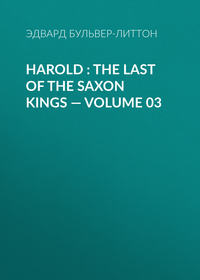Kitap dosya olarak indirilemez ancak uygulamamız üzerinden veya online olarak web sitemizden okunabilir.
Kitabı oku: «Harold : the Last of the Saxon Kings — Volume 03», sayfa 7
NOTE (R)
The Interment of Harold.
Here we are met by evidences of the most contradictory character. According to most of the English writers, the body of Harold was given by William to Githa, without ransom, and buried at Waltham. There is even a story told of the generosity of the Conqueror, in cashiering a soldier who gashed the corpse of the dead hero. This last, however, seems to apply to some other Saxon, and not to Harold. But William of Poitiers, who was the Duke's own chaplain, and whose narration of the battle appears to contain more internal evidence of accuracy than the rest of his chronicle, expressly says, that William refused Githa's offer of its weight in gold for the supposed corpse of Harold, and ordered it to be buried on the beach, with the taunt quoted in the text of this work—"Let him guard the coast which he madly occupied;" and on the pretext that one, whose cupidity and avarice had been the cause that so many men were slaughtered and lay unsepultured, was not worthy himself of a tomb. Orderic confirms this account, and says the body was given to William Mallet, for that purpose.49
Certainly William de Poitiers ought to have known best; and the probability of his story is to a certain degree borne out by the uncertainty as to Harold's positive interment, which long prevailed, and which even gave rise to a story related by Giraldus Cambrensis (and to be found also in the Harleian MSS.), that Harold survived the battle, became a monk in Chester, and before he died had a long and secret interview with Henry the First. Such a legend, however absurd, could scarcely have gained any credit if (as the usual story runs) Harold had been formally buried, in the presence of many of the Norman barons, in Waltham Abbey—but would very easily creep into belief, if his body had been carelessly consigned to a Norman knight, to be buried privately by the sea-shore.
The story of Osgood and Ailred, the childemaister (schoolmaster in the monastery), as related by Palgrave, and used in this romance, is recorded in a MS. of Waltham Abbey, and was written somewhere about fifty or sixty years after the event—say at the beginning of the twelfth century. These two monks followed Harold to the field, placed themselves so as to watch its results, offered ten marks for the body, obtained permission for the search, and could not recognise the mutilated corpse until Osgood sought and returned with Edith. In point of fact, according to this authority, it must have been two or three days after the battle before the discovery was made.
This William Mallet was the father of Robert Mallet, founder of the Priory of Eye, in Suffolk (a branch of the House of Mallet de Graville).—PLUQUET. He was also the ancestor of the great William Mallet (or Malet, as the old Scandinavian name was now corruptly spelt), one of the illustrious twenty-five "conservators" of Magna Charta. The family is still extant; and I have to apologise to Sir Alexander Malet, Bart. (Her Majesty's Minister at Stutgard), Lieut.- Col. Charles St. Lo Malet, the Rev. William Windham Malet (Vicar of Ardley), and other members of that ancient House, for the liberty taken with the name of their gallant forefather.
[Закрыть]
